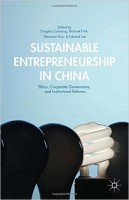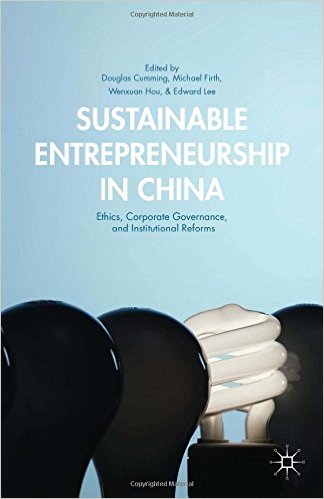 Editors: Douglas Cumming, Michael Firth, Wenxuan Hou, and Edward lee
Editors: Douglas Cumming, Michael Firth, Wenxuan Hou, and Edward lee
Publisher: Palgrave Macmillan – 191 pages
Book Review by: Sonu Chandiram
China today is the fastest-growing (and perhaps the second largest) economy in the world, with hundreds of millions of its 1.2 billion people in the country lifted out of poverty, and the economic outlook very bright for those who are not yet enjoying prosperity borne of broad-based development.
The Chinese people’s progress is due mainly to the remarkable public-private partnership that has emerged in the last few decades. The entrepreneurial thinking, ingenuity, and innovation of its people and the companies they have established and run, has enabled China to become an economic powerhouse, and envied by the rest of the world.
The government of China has been instrumental in moving the country forward. Its bold planning, massive financing, and aggressive implementation of development programs show impressive results in infrastructure: modern buildings, highways, bridges, and other elements of a modernized country. All this has been possible because the government and the business sector are working hand-in-hand, based on observations and my conversations with business people who work and live in China and in Hong Kong who go there frequently for business.
The road to fast growth started in the late 1970s when China’s government undertook institutional reforms to transform the country from having a centrally-planned to a market-based economy, the editors and writers point out in their Introduction. These reforms have promoted and expanded entrepreneurship, and improved the business environment in the last three decades up to now.
In order for their companies to grow larger and compete locally and on a global scale, Chinese entrepreneurs have sought, and received, hundreds of billions of dollars of capital from local banks, but also from overseas investors. As they’ve grown bigger, investor confidence has been tested, as issues in business ethics and corporate governance have arisen.
This book, while less than 200 pages long, is the combined work of 19 people. They are professors, students, researchers and professionals at financial firms in Canada, China, Hong Kong, the United Kingdom, and the United States who look at quite a few such issues, as well as others, as we show you below, to give you a bird’s eye view:
- Corporate Fraud and Bank Loan Contracting: Evidence from China
- Corporate Governance and Diversity in Chinese Banks
- Institutional Logics and Financing Mechanisms: A Comparative Study of Ningbo and Wenzhou Entrepreneurs
- Transgenerational Succession and Financial Risk Taking of Family Firms: Evidence from China
- The Qualified Foreign Institutional Investor System and Corporate Governance in China
- Accounting performance Inflated by Private Equity before IPOs: Evidence from Chinese Firms
- The Split-Share-Structure in China: Past, Procedure. And Impact
These observers of China’s economy examine how such factors as we outline above, affect economic growth and its sustainability in view of the challenges they pose. In this book the writers raise and answer such questions as the following:
- How do institutional reforms attract talent and facilitate entrepreneurship?
- What kind of regulation encourage venture capital, private equity, and other forms of investment in this kind of entrepreneurship?
- Do corporate governance mechanisms affect capital acquisition of entrepreneurs, and are they different for entrepreneurs in this kind of entrepreneurship?
- Do ethical entrepreneurs and venture capital investment in ethical entrepreneurships perform better?
- What are the appropriate performance metrics for ethical entrepreneurs?
- How do foreign investors perform corporate governance roles for entrepreneurs, and are there differences for entrepreneurs in ethical and sustainable industries?
I suggest you read the book to explore these questions and get your answers.
Editors:
Douglas Cumming is Professor of Finance and Entrepreneurship and Ontario Research Chair at the Schulich School of Business, York University. He has published over 120 articles in leading refereed academic journals in economics, finance, law and management, such as the Academy of Management Journal, Journal of Financial Economics, and Review of Financial Studies.
Michael Firth is the Hong Kong Economic Journal Chair Professor of Finance at Lingnang University, Hong Kong. He has held academic positions in Europe, Australasia, North America, and Asia, and has previously worked in public accounting and investment banking. His teaching and research interests are in accounting and finance.
Wenxuan Hou received his PhD from the University of Manchester. He is reader in Finance at the University of Edinburgh. He is also an associate editor of the European Journal of Finance, and a guest coeditor of the special issues of Abacus, International Small Business Journal, and Journal of Business Ethics. His research focuses on corporate governance and emerging markets.
Edward Lee is a professor of Accounting and Finance at Manchester Business School at the University of Manchester, United Kingdom. His research focuses on the interrelationship between corporate disclosure, regulatory reform, and capital market.







